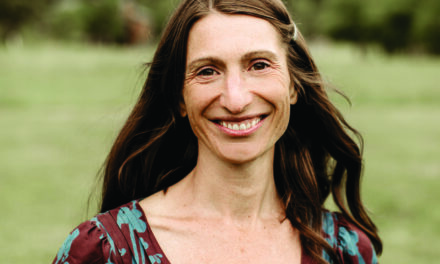“We can weep and call it singing”—one of my favorite lines from the Iron & Wine song “Call It Dreaming.” What if this was it? A simple shift in how we experience our grief, our tears, our weeping? What if they’re not just tears but music notes, battle cries, prayers? What if suppressing our grief actually suppresses the very thing that’s here to heal us—and heal others?
I was working as a nurse in triage when a woman started crying in the waiting room. She was bleeding profusely, screaming that she lost her baby. I wheeled her into the ER, watching a trail of blood follow us. In the room, she was shaking, weeping, howling from her gut for the loss of her child. I brought her to my chest and held her tight, cupped her head in my hands, looked directly into her eyes. “I am so sorry,” I told her. “We’re going to find out what’s going on.” I saw relief on her face, but her eyes told me she already knew nothing could be done. I hugged her again as another nurse came in.
Two days later, I saw my own trail of blood. I was losing my own baby—a baby I’d just discovered the morning before. We’d already started planning where to put the crib, the changing table. I remembered my patient, this beautiful woman, and how she screamed her war cry, battling for the life of her baby. I pulled at my clothes and screamed my own battle cry as I wept for both her loss and mine. Her grief became my grief. Her battle cry taught me how to grieve my own loss.
What if our battle cries aren’t just for our own losses but for everyone who has miscarried and everyone who will? Our tears aren’t just for us—they’re for the communal grief we all experience when we lose what can never be replaced.
When we think of grief as communal, we see how our grief connects and how our healing connects. When we weep openly, we create precious, intimate space for others to join us, hold us, grieve alongside us. She had no idea her battle cry became mine, and I wish I could thank her for teaching me how to sing my grief.
I grew up singing in church. It was always my favorite part. I was told I had a good voice (not great, but good—I’ll take it). So I’d sing as loud as I could, making sure everyone around me could hear. Now I find church in spaces of shared grieving, where we don’t hide our grief but sing it out loud for ourselves and with each other.
At 26, my sister went into a coma for months. When she awoke, she couldn’t move or speak. Something in her brain disrupted how her breath and vocal cords worked together. She could only make sound when weeping in grief or laughing in joy—and both sounded exactly the same. You could never tell if she was weeping or laughing.
Listening to her oscillate between grief and joy every day, I realized both emotions come from the same deep well within us. Maybe grief and joy aren’t separate experiences but two sides of the same coin. Maybe my singing was my weeping, and my weeping, my singing.
The next time you hear someone weeping, think of it as an invitation to sing along, to battle cry with them, or simply to witness how we have so many ways to share our grief openly and communally. When it’s your time to grieve, I hope you’ll remember to sing—to sing your sweet gift of song out into the world for others to hold alongside you. And the next time someone is brave enough to cry in front of you, I invite you to simply say, “Thank you for sharing your tears with me.” Sometimes the most healing thing we can offer isn’t comfort—it’s witness.

